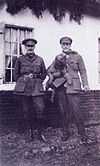Eton Manor Boys' Club
 | |
| Motto | Up the Manor |
|---|---|
| Established | 1909 |
| Closed | 1967 |
| Type | Boys club |
| Founder | Gerald V Wellesley |
| Location |
London E20 2ST England Coordinates: 51°33′14″N 0°00′54″W / 51.554°N 0.015°W |
| Gender | Boys |
| Ages | 14–16 |
| Publication | Chinwag[1] |

Eton Manor Boys' Club was a boys sports club in London, England.
History
Establishment
Eton Manor Boys' Club takes its name from Eton College, which from the 1880s had run a Christian Mission to raise living standards in the Hackney Wick area of the East End of London and the Manor Farm bought in 1912 to build a new sporting clubhouse. The Mission Church, St Mary of Eton, is still the Parish Church, but combined with the bombed St Augustine after the Second World War. It is now called St Mary of Eton with St Augustine. In 1973 the connections with Eton College were severed.
In 1909 four Old Etonian philanthropists founded Eton Manor Boys' Club to provide sporting facilities separate from the Eton Christian Mission.[1] They were Gerald V. Wellesley, Arthur Villiers, the second son of Victor Child Villiers, 7th Earl of Jersey; Edward Cadogan, the sixth son of George Cadogan, 5th Earl Cadogan and Alfred Wagg of the City of London Wagg Banking Family.[1] Gerald Wellesley passed on the leadership of the club to Arthur Villiers after the Great War; Villiers remained the primary guiding force behind the club until its closure.[2] He lived at Eton Manor Boys' Club from 1913 until his death in 1969.[1]
The club only accepted boys who had been previous members of the Eton Mission Boys’ Club.[1] Additionally, the club's rules also stated that only boys between the ages of 13 and 16 could join, any boys past the age of 16 weren't allowed to join.[1][3] The club also restricted boys from interacting with girls.[1]
The club's coaches included well-known sportsmen including Douglas Jardine and Alf Ramsey.[3] Boys who passed the age of 18 were able to join the "Old Boys" club.
In 1920 an old rubbish tip site on the eastern end of Hackney Marshes was converted into the Club's new sports ground, it became well known as The Wilderness.[3] Facilities included nine football pitches, two rugby pitches, cricket pitches, six tennis courts, a bowling green, a squash court and a running track.[3]
In the 1950s, the club had a reputation as an elite boys sporting club as well as incorporating career advice to the club's list of activities.[4]
At its peak the Club had become a leading member of the London Federation of Boys' Clubs with success in many sports. It produced double Olympic Gold Medal middleweight boxer Harry Mallin[3][5] at the 1920 Antwerp Olympics and 1924 Paris Olympics, and welterweight boxer Nicholas Gargano a bronze medal winner at the 1956 Melbourne Olympics.[3][6] A 2010 news article stated that Gargano would strengthen his arms by chopping wood at the clubhouse[7] and also learned how to box at the club.[5] The 1948 London Olympic athletics track transferred to the Eton Manor Boys' Club on The Wilderness playing fields for continued legacy use.[3][8]
Closure
In the mid 1960s, Arthur Villiers decided to close the Eton Manor. The reasons were unclear, although both costs and the changing nature of the surrounding population have been cited as possible explanations.[2]
The playing fields at Eton Manor fell into disuse by 2001, before being selected as part of the London bid for the proposed London 2012 Olympic Games. The site became the venue for the 2012 Summer Paralympics tennis venue Eton Manor.[9] Eton College has a second connection to the 2012 Olympic and Paralympic Games, as the rowing event venue is the College's private facility, Dorney Lake.[10]
The remaining Archives of the Eton Manor Boys' Club are held at the Bishopsgate Library.[3]
Villiers Park
After Eton Manor closed in 1967, The Manor Charitable Trust, which supported it, moved into the educational field and in 1968 renamed its Oxfordshire centre Villiers Park. Its other educational centre in Cambridgeshire, which opened in 1989, was also named Villiers Park. The trust's main buildings at the Cambridge site – Cadogan House, Wellesley House and Wagg House – are named for colleagues of Villiers who were also involved in the establishment of the trust.) In 2000 The Manor Charitable Trust changed its name to Villiers Park Educational Trust. Under that name it operates a scholars programme, subject-specific residential courses, and advisory programme for schools.[4]
Eton Manor Association
There is an active group of Eton Manor Boys' Club Old Boys, the Eton Manor Association. It continued to honour the former Club Members who died during the First World War and the Second World War by having a Remembrance Sunday Service on The Wilderness by the Memorials placed there. The Olympic Delivery Authority, LOCOG and the Olympic Park Legacy Company which in 2012 became the London Legacy Development Corporation have successively combined to provide a safe storage area of the Memorials removed during the development and use of The Wilderness site for the London 2012 Olympics, they will be restored to the Eton Manor site in 2014.[8]
Sports clubs
Six sports clubs originating from Eton Manor Boys' Club and the Eton Mission are still in existence : Eton Manor R.F.C.,[11] now playing at The New Wilderness ground in Wanstead, Eton Manor F.C., now playing at the Capershotts ground in Waltham Abbey, Eton Manor A.C.,[12] meeting at Waltham Forest Track and Pool in Walthamstow (young athletes) and The Cottage, Marsh Lane, in Leyton (senior athletes), The Otters Water Polo Club,[13] meeting at Beacontree Heath Leisure Centre in Dagenham. There is also an Eton Manor Golf Society. The Eton Mission Rowing Club founded in 1885[14] and with its own boathouse since 1911,[15] which was rebuilt in 1934,[15] is still active as a private rowing club[15] on the Hackney Cut canal, within sight of the London 2012 Olympic Stadium.[15]
Cultural references
Film
- The 2011 Alexandra Boyd short film You Don't Have to Fight to Win is set at Eton Manor Boys' Club.[16]
- The 2018 Alexandra Boyd feature film The Wilderness tells the story of Eton Manor Boys' Club from 1912 - 1924 and its star Olympian boxer Harry Mallin.

Poetry
- The Poet Laureate, Carol Ann Duffy, was commissioned by the Olympic Development Authority to write a poem about the history of the Eton Manor Boys' Club. This was first performed in February 2012 at the Eton Manor Rugby Club.[17][18]
References
- ↑ 1.0 1.1 1.2 1.3 1.4 1.5 1.6 "Adventures in the Wild East: The Early Years of the Eton Manor Boys' Clubs". villierspark.org.uk. Retrieved 3 September 2012.
- ↑ 2.0 2.1 Geraldine Bedell, "To the Manor born", The Guardian, 28 July 2007.
- ↑ 3.0 3.1 3.2 3.3 3.4 3.5 3.6 3.7 "Eton Manor Boys' Club History". bishopsgate.org.uk. Retrieved 3 September 2012.
- ↑ 4.0 4.1 "A Brief History of the Eton Manor Boys' Club". villierspark.org.uk. Retrieved 1 September 2012.
- ↑ 5.0 5.1 Metheral, Ken (28 September 1956). "Slight Lad Is Toughie In The Ring". Ottawa Citizen. Retrieved 3 September 2012.
- ↑ Associated Press (1 March 2012). "'To sprint, swim:' UK poet celebrates Olympics". ESPN. Retrieved 3 September 2012.
- ↑ Magnay, Jacqueline (25 July 2010). "London 2012 Olympics: renewal stirs the memories". The Daily Telegraph. Retrieved 3 September 2012.
- ↑ 8.0 8.1 "Poet Laureate's tribute to sports club rooted in the Olympic Park". london2012.com. 1 March 2012. Retrieved 3 September 2012.
- ↑ Brown, Carl (30 October 2009). "OLYMPICS: First look at what WE are getting from the 2012 Games". guardian-series.co.uk. Retrieved 3 September 2012.
- ↑ "London 2012: Who's the guy on the motorbike and other conundrums". The Guardian. 4 August 2012. Retrieved 3 September 2012.
- ↑ "Eton Manor RFC". pitchero.com. Retrieved 3 September 2012.
- ↑ "Eton Manor A.C". eton-manor.com. Retrieved 3 September 2012.
- ↑ "Club History". easternotters.co.uk. Retrieved 3 September 2012.
- ↑ "Eton Mission Rowing Club". etonmissionrc.webeden.co.uk. Retrieved 3 September 2012.
- ↑ 15.0 15.1 15.2 15.3 "EMRC". etonmissionrc.webeden.co.uk. Retrieved 3 September 2012.
- ↑ "You Don't Have To Fight To Win". thewildernesscompany.uk. Retrieved 3 September 2012.
- ↑ "Poet Laureate's tribute to sports club rooted in Olympic Park". london2012.com. 1 March 2012. Retrieved 3 September 2012.
- ↑ The Sheridan Press (1 March 2012). "Britain's Poet Laureate celebrates the Olympics". townnews.com. Retrieved 3 September 2012.